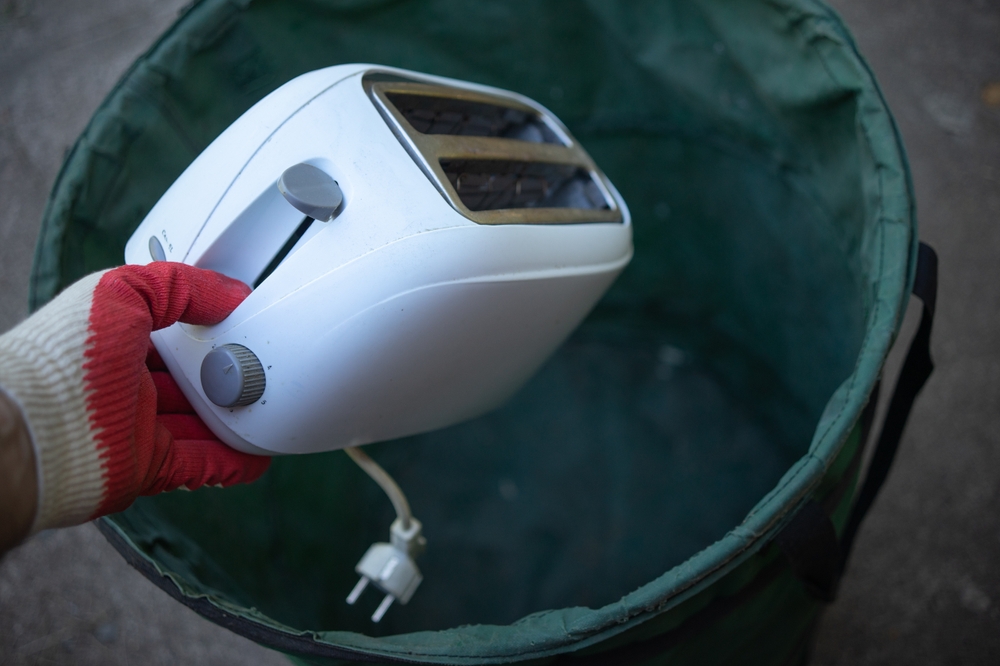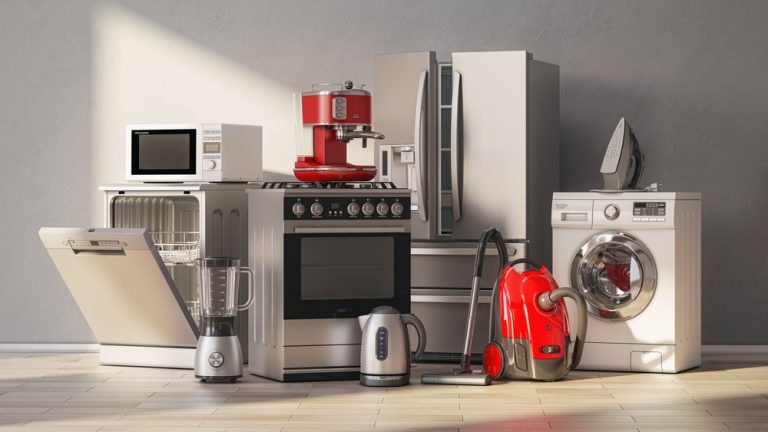Where to Dispose of Old Kitchen Appliances?

As kitchen appliances age or break down, many homeowners face the question: where to dispose of old kitchen appliances? Whether it’s a refrigerator, stove, dishwasher, or microwave, disposing of these bulky items can be a challenge. Simply throwing them in the trash isn’t an option, as many appliances contain materials that can be harmful to the environment if not disposed of properly.
In this guide, we’ll explore the best options for safely and responsibly disposing of old kitchen appliances, including recycling, donation, and professional services.
Why Proper Disposal of Kitchen Appliances is Important?
Before delving into where to dispose of old kitchen appliances, it’s essential to understand the importance of responsible disposal.
Environmental Impact
- Hazardous Materials: Many kitchen appliances, such as refrigerators and freezers, contain harmful substances like refrigerants and chemicals. If these are not properly disposed of, they can leak into the environment and contribute to pollution.
- Metal and Plastic Waste: Kitchen appliances are made from materials like metal, plastic, and glass, which take years to break down in landfills. Recycling or properly disposing of these items helps reduce landfill waste and conserves natural resources.
Legal Requirements
- Regulations on Disposal: In many areas, local laws or ordinances regulate how old kitchen appliances should be disposed of. Improper disposal, such as leaving appliances on the curb or dumping them illegally, can result in fines or penalties.
- Manufacturer Take-Back Programs: Some manufacturers are required to offer take-back programs for their appliances to ensure that they are disposed of responsibly. These programs often comply with environmental regulations and laws.
Also Read – How Best to Pack Bulky Kitchen Appliances?
Options for Disposing of Old Kitchen Appliances
Now that we understand the importance of responsible disposal, let’s explore where to dispose of old kitchen appliances. There are several options available, depending on the condition of your appliances and your location.
Recycling Centers
- Local Recycling Programs: Many municipalities have designated recycling centers that accept old kitchen appliances. Check with your local waste management or recycling program to see if they offer appliance recycling. Some recycling centers even offer free pick-up for larger items.
- Specialized Appliance Recycling: Certain recycling centers specialize in appliances, where they dismantle and recycle each component separately. For example, the metal is recycled, hazardous materials are safely disposed of, and plastic is reused.
- E-Waste Recycling: For appliances with electrical components, such as microwaves or dishwashers, consider taking them to an e-waste recycling facility. These centers are equipped to handle electronic waste and safely dispose of any hazardous materials.
Donation
- Donate to Charity: If your kitchen appliances are still in working condition but you’re upgrading to newer models, consider donating them to a local charity. Organizations like Habitat for Humanity, Salvation Army, or Goodwill often accept used appliances for resale or to help low-income families.
- Community Programs: Some communities run programs that accept gently used appliances for families in need. Donating locally not only helps someone in your area but also reduces waste by giving your appliance a second life.
- Appliance Reuse Stores: Some nonprofit organizations and reuse stores accept working appliances and resell them at affordable prices. This is another way to ensure your old appliances don’t go to waste while helping others in need.
Trade-In Programs and Manufacturer Take-Backs
- Manufacturer Take-Back Programs: Many appliance manufacturers offer take-back programs where they will accept your old appliance for recycling when you purchase a new one. Some companies, such as GE or Whirlpool, offer this service, ensuring proper disposal of your old appliance.
- Retailer Trade-In Programs: Some retailers, such as Best Buy or Home Depot, provide trade-in programs where you can bring in your old kitchen appliance and receive a discount on a new one. The retailer will then dispose of the old appliance in an eco-friendly way.
- Energy-Efficient Upgrades: Trade-in programs are often available as part of energy-efficient appliance upgrades. For example, when purchasing a new energy-efficient refrigerator, the retailer might take your old one for free or offer a rebate.
Professional Appliance Removal Services
- Junk Removal Companies: Professional junk removal companies like 1-800-GOT-JUNK or College Hunks Hauling Junk offer services for picking up and disposing of old kitchen appliances. They ensure that appliances are disposed of in compliance with local laws, and many companies aim to recycle or donate items whenever possible.
- Curbside Pickup Services: In some areas, local waste management services offer curbside pickup for large appliances. You may need to schedule a pickup in advance or pay a small fee, but this is a convenient option if you don’t have a way to transport the appliance to a recycling center.
Sell or Give Away
- Sell Online: If your old kitchen appliances are still functional, consider selling them through online platforms like Craigslist, Facebook Marketplace, or OfferUp. Selling old appliances not only earns you some extra cash but also keeps the appliance in use rather than adding it to a landfill.
- Give Away Locally: If you’re not interested in selling, you can give away your appliance through community platforms like Freecycle or Buy Nothing groups. Many people are looking for affordable or free appliances, so giving away your item is a sustainable way to dispose of it.
How to Prepare Old Kitchen Appliances for Disposal?
Now that you know where to dispose of old kitchen appliances, it’s important to prepare the appliance for recycling, donation, or pick-up.
Clean the Appliance
- Empty and Defrost: If you’re disposing of a refrigerator or freezer, make sure to empty it of all contents and defrost it. Wipe down the inside and remove any food particles to prevent mold or unpleasant odors.
- Wipe Down Surfaces: Clean the outside of the appliance as well, especially if you’re donating or selling it. A clean appliance is more likely to be accepted by donation centers or buyers.
Disconnect and Remove Cords
- Unplug Safely: Ensure the appliance is unplugged before moving it. If it’s connected to a water or gas line (such as a dishwasher or stove), carefully disconnect these lines. For gas appliances, consider hiring a professional to ensure safety.
- Remove Detachable Parts: Remove any detachable parts like refrigerator shelves or oven racks. Wrap these parts separately, especially if you’re donating the appliance, to ensure everything arrives intact.
Secure Moving Parts
- Tape Doors and Drawers: Secure the doors and drawers of appliances like refrigerators, ovens, and dishwashers using strong packing tape. This prevents them from swinging open during transport.
Tips for Choosing the Best Disposal Option
When deciding where to dispose of old kitchen appliances, here are some tips to help you choose the best option:
Consider the Condition of the Appliance
- Working Condition: If the appliance is still in good working order, donating or selling it is a better option than disposal. This gives the appliance a second life and helps someone in need.
- Non-Working Condition: If the appliance is no longer functional, recycling or using a professional removal service is the most responsible option to prevent environmental damage.
Check Local Regulations
- Waste Management Rules: Always check your local waste management regulations to see if there are any specific requirements for disposing of old kitchen appliances. Many cities offer special recycling or disposal programs for large appliances.
Consider the Environmental Impact
- Recycling and Donating: Recycling and donating are the most environmentally friendly options for appliance disposal. These options reduce landfill waste and promote the reuse of valuable materials.
- Avoid Illegal Dumping: Never dispose of old appliances in unauthorized locations, such as public streets or empty lots. Illegal dumping can lead to fines and significant environmental harm.
Conclusion
Knowing where to dispose of old kitchen appliances is essential for responsible and environmentally friendly disposal. Whether you’re recycling, donating, trading in, or using a professional removal service, there are plenty of options available to ensure your old appliances don’t end up in landfills.
By choosing the right disposal method, you can protect the environment, comply with local regulations, and even give your appliance a second life through donation or resale.






